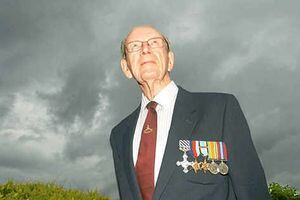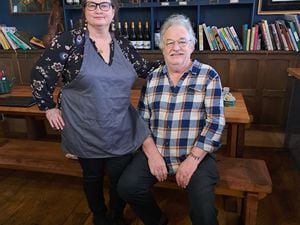Memorial day at last for the Bomber Boys
"I prayed before every raid. We had a job to do and I?just hoped for survival. I prayed not only for my survival, but for everybody's."

I prayed before every raid. We had a job to do and I?just hoped for survival. I prayed not only for my survival, but for everybody's."
John Trotman was one of the Bomber Boys who came back alive. Now aged 90, the hero from Marchamley Wood, near Wem, flew 70 hazardous missions in Wellington and Mosquito bombers during the Second World War.
Tomorrow, he will be among the rapidly dwindling number of surviving 'forgotten heroes' invited to attend the Queen's unveiling of the new £2 million Bomber Command Memorial in London.
The memorial in Green Park will finally honour the 55,573 fallen Bomber Boys, considered the bravest of the brave of their generation and who paid the ultimate sacrifice fighting Hitler's war machine.
But it has been a long time coming. Veterans of Bomber Command have always believed their fallen comrades became victims of political correctness after the war as politicians sought to distance themselves from the policy of area bombing, which led to widespread civilian casualties.
Even Churchill snubbed Bomber Command when he highlighted the vital contribution of every branch of the services in winning the war, but pointedly made no reference to the Bomber Boys.
"I think we were considered the 'naughty boys' of the war, associated with the fact that it all ended with the situation at Dresden," says Mr Trotman, as he prepares to travel to London for the unveiling.
"What good we achieved previously died with that. They were given medals during the war but it went into the background.
"It is recognition after all these years, but it is also paying tribute to the memory of fallen friends, whose planes crashed, blew up or were shot down, or who just went missing. It was not uncommon."
Mr Trotman lost many Bomber Command comrades during sorties, including two of his own navigators. On operations, he would leave British soil not knowing if he, or his comrades, would return.
"It is very important to remember the sacrifices that these young men made towards the freedom and independence of this country," he says.
"I think the memorial is excellent, from what I have seen of it. I am very pleased to be going."
During the Second World War, the Spitfires and Hurricanes of RAF Fighter Command defended the United Kingdom against German aerial attacks, most notably during the Battle of Britain while RAF Bomber Command's role was to attack the enemy's own military strength – by bombing their airbases, shipping, troops, communications and all industries used in the German war effort.
Repeated attacks on the German homeland also caused the diversion of industrial war production to defensive rather than offensive weapons and equipment. Forcing the Germans onto the defensive was a critical factor in the liberation of Europe and the defeat of Nazi Germany in 1945.
"I prayed before every raid. We had a job to do and I just hoped for survival. I prayed not only for my survival but for everybody's – but it did not work for everybody," says Mr Trotman.
He recalls how the power of ESP, or extra sensory perception, which his maternal grandmother possessed had, came to him on his flight missions.
"Because I was alongside death during the war, some came to me. I felt there was a guardian angel on my shoulder. As we went into one raid we went through flak so intense it was like nothing I'd experienced before. Suddenly the voice said 'if you go through that you are not going to come out', and, for the only time in my career, instead of flying through it I turned slightly and 'threw' the bombs out."
For his acts of valour and courage, Mr Trotman was awarded the Distinguished Flying Cross and Bar.
His exploits are recalled in his book, J for Johnnie, which tells of his two operational tours and of a wartime career in which he clocked up over 2,000 flying hours and walked away from three crashes.
Mr Trotman joined the RAF at the age of 18. "I liked the uniform and I fancied the idea of flying," he says with a smile today.
His first tour was with 150 Squadron, based at RAF Snaith in Yorkshire, flying a Vickers Wellington III (call-sign 'J' for Johnnie) to attack many German cities, including Cologne, Hamburg, Munich and Ludwigshafen. After a spell as a flying instructor at RAF Tilstock and RAF Peplow he volunteered for a second operational tour and was soon flying a De Havilland Mosquito VI with 692 Squadron, based at RAF Graveley in Cambridgeshire.
The fact that civilians were killed weighs heavily upon Mr Trotman. He does not necessarily agree with any policy of bombing civilian targets, but says he and his comrades were simply doing their jobs.
"The job was to destroy German targets and later to destroy the morale of the civilian population of Germany. I would not totally agree with the policy (of bombing civilian targets), but we had specific targets. I had specific targets, such as factories, and while we were bombing them people could not work in them."
When the war was finally over, Mr Trotman, a Flight Lieutenant, and a number of ground crew flew a Mosquito on 'a cook's tour of German cities and the devastation was appalling'.
"There was barely anything standing," he says. "I was amazed to see the result of what we had done."
Public support today for the efforts and bravery of RAF Bomber Command during the war is undeniable.
Chairman of the memorial planning committee, councillor Alastair Moss, said: "This new landmark for London is a fitting tribute to the heroes of Bomber Command.
"It is a sign of this country's gratitude to these exceptional people who were brave enough to fight for us and it will stand as an iconic London monument marking how good came to triumph over evil for many generations to come."
J for Johnnie, By John Trotman, costs £9.95, including a contribution to Lingen Davies Appeal, and is available through Shrewsbury Words on 01743 366933. The book is also available on Amazon or direct from publishers Woodfield at www.woodfieldpublishing.co.uk





